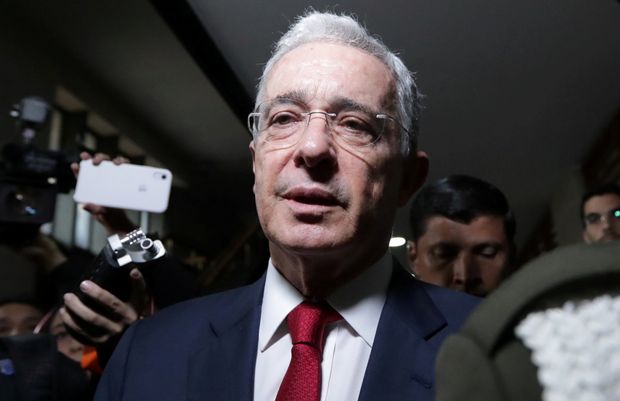
Former Colombian President Álvaro Uribe, pictured in October, received a congratulatory tweet from President Trump on Saturday.
Photo: luisa gonzalez/Reuters
BOGOTÁ, Colombia—A judge rescinded a house-arrest order on Saturday against powerful former President Álvaro Uribe, who is being investigated for witness tampering in a case that has divided Colombia.
Bogotá Judge Clara Ximena Salcedo accepted a petition by Mr. Uribe’s lawyers that the home arrest ordered by the Supreme Court in August should be lifted because the former president hasn’t been charged with any crime. Mr. Uribe is still under investigation.
“Without charges, there can be no measure (of house arrest) and so this implies the need to restore the fundamental rights of Dr. Álvaro Uribe Vélez,” Judge Salcedo said in a virtual hearing.
The ruling was celebrated by Mr. Uribe’s followers, who had criticized the high court for the arrest order against a leader they revere for having led a U.S.-backed military offensive in the 2000s that hobbled the Revolutionary Armed Forces of Colombia and prompted the rebel group into peace talks. The former commanders of that guerrilla group now serve in Congress, even though they are accused of serious crimes, his supporters note.
Mr. Uribe, a 68-year-old conservative and mentor to President Iván Duque, posted a brief message on his Twitter account after the ruling: “Thank God.”
President Trump, an Uribe admirer who is seeking Latino support in his U.S. reelection bid, tweeted: “Congratulations to former President @AlvaroUribeVel, a hero.”
Mr. Uribe has been under investigation for allegedly paying a former member of Colombia’s now-defunct paramilitary militia to change testimony he had provided about the former president’s alleged role in helping establish the armed groups. Mr. Uribe, who led Colombia from 2002 to 2010, has publicly denied wrongdoing in the alleged witness-tampering case and about any ties to paramilitary organizations.

A caravan of Uribe fans in Cali, Colombia, showed their support in August.
Photo: Ernesto GuzmÃ(degrees)N Jr/Zuma Press
After the house arrest order from the Supreme Court, the only entity that can investigate lawmakers in Colombia, Mr. Uribe resigned his Senate seat. That automatically transferred his case to the Attorney General’s office and the country’s accusatory system of justice. Under that system, Judge Salcedo said, a person can’t be jailed or held under house arrest unless charges have been filed.
The case against the former president, though, continues. Prosecutors are trying to determine the veracity of testimony from a jailed former paramilitary fighter, Juan Monsalve, who said that Mr. Uribe played a role in founding an armed group on the former president’s family ranch, Guacharacas, in the 1990s. Investigators will try to determine whether Mr. Uribe, through emissaries, tried to bribe Mr. Monsalve to get him to retract his testimony.
“The investigation does not start from scratch,” Prosecutor Gabriel Ramón Jaimes told the court. “There will not be impunity, there will be justice.”
The case against Mr. Uribe has stoked tensions between his supporters and those who say the security services under his control committed widescale rights abuses. A cattleman and former mayor of Medellín, Mr. Uribe became a popular president as he brought a once-chaotic country under control, reducing the size of drug crops, pacifying wide swaths of the countryside and reviving the economy.
But his Achilles heel was the United Self-Defense Forces of Colombia. The illegal paramilitary group was formed by ranchers and businessmen to fight rebels but it morphed into death squads that killed thousands of civilians. Though investigations of possible ties to Mr. Uribe have never borne fruit, the allegations have dogged him since he was governor of Antioquia Province in the 1990s.

A poster of Mr. Uribe as defaced. Some Colombians say security services under the former leader’s control committed widescale rights abuses.
Photo: Daniel Garzon Herazo/Zuma Press
“I consider that there exists serious evidence that provides proof of the intervention of Álvaro Uribe in the formation of paramilitary groups,” said Luis Eduardo Montealegre, a former attorney general who opposes Mr. Uribe.
Mr. Uribe has strongly denied any such ties. He has repeatedly said that his presidency apprehended the most bloodthirsty paramilitary commanders and extradited them to the U.S. to face drug-trafficking charges.
Aldo Civico, a Columbia University researcher on paramilitary groups, said he has over the years asked some of the top commanders in interviews about possible ties with Mr. Uribe. “None of the paramilitary leaders admitted or told me that Uribe was part of the organization or was influential in the organization or had anything directly to do with the organization,” said Mr. Civico, who nevertheless got those commanders to admit a range of grisly crimes.
—Jenny Carolina González contributed to this article.
Write to Juan Forero at Juan.Forero@wsj.com
Copyright ©2020 Dow Jones & Company, Inc. All Rights Reserved. 87990cbe856818d5eddac44c7b1cdeb8


